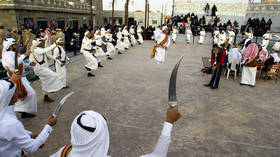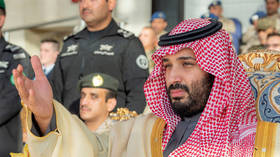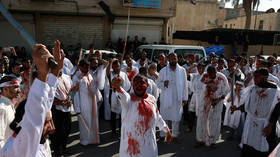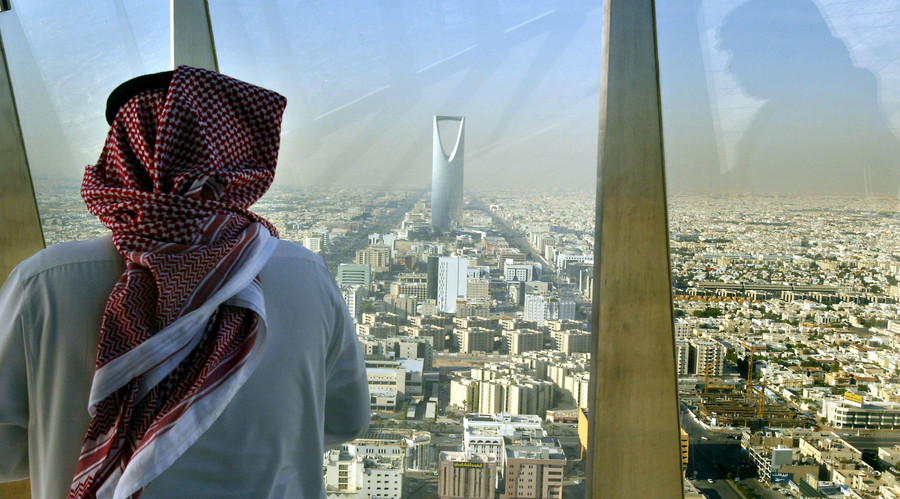https://www.rt.com/business/457514-wall-street-saudi-executions/
Wall Street bankers make triumphant return to Saudi Arabia just in time for mass beheadings
Published time: 25 Apr, 2019 11:56
Get short URL

Saudi men perform a traditional dance during Janadriyah Cultural Festival on the outskirts of Riyadh © Reuters / Faisal Al Nasser
Big investors, particularly from Wall Street, joined panels at the two-day financial forum which began on Wednesday in Riyadh.
Larry Fink, CEO of US investment corporation BlackRock, told the conference that his company had bought some of Saudi state-owned oil giant Aramco’s bonds and was looking for other “opportunities” in the kingdom.
Also on rt.com Saudi Arabia beheads 37 people, mostly from Shia minority, puts body on display
“This is an economy that we have a lot of confidence in, I think the future is bright,” he said, adding: “We are excited about the role that we can continue to play here.”
Fink added: “The changes here in the kingdom in the last two years are pretty amazing.”
He was joined by HSBC CEO John Flint, co-president of JPMorgan Chase Daniel Pinto, and others. Goldman Sachs CEO David Solomon reportedly visited Riyadh earlier this month, just days before the bank helped arrange a multibillion dollar bond sale for Aramco.
READ MORE: Saudis say forget Khashoggi & let's do business – RT's Boom Bust checks if anyone's interested
The summit is taking place as Riyadh announced on Tuesday it had executed 37 people in connection with alleged ‘terrorism crimes.’ The majority of those killed were Shiite Muslims.
United Nations High Commissioner for Human Rights Michelle Bachelet condemned the mass executions, calling them “shocking” and “abhorrent.” “At least 3 [of the men] were minors when sentenced & one of the men’s bodies was put on public display,” her office said in a statement on Twitter.
Also on rt.com Saudi Arabia could be bankrupt by 2020 – IMF
The presence of global leaders is in sharp contrast to a similar event last year. Many political and business elite decided to skip that forum due to the international scandal over the killing of Washington Post journalist Jamal Khashoggi. After initial denials, Riyadh admitted that Khashoggi was murdered by “rogue” agents of the Saudi government while visiting the country’s consulate in Istanbul last October.
READ MORE: Goldman Sachs boss shows up in Saudi Arabia as uproar over Khashoggi killing fades
Despite that, big investors appear to be focused on potential deals in the largest Arab economy.
Saudi Energy Minister Khalid al-Falih told the forum that Aramco would be active in debt markets and that the $12 billion it raised in its debut bond issue was “only the beginning.” The country’s stock market, which has seen an upsurge in foreign fund flows since the start of 2019, is one of the best performing in the region, up nearly 18 percent year-to-date.
For more stories on economy & finance visit RT's business section
https://www.rt.com/news/457375-saudi-executions-sham-trial/
Saudi Arabia beheads 37 people, mostly from Shia minority, puts body on display
Published time: 24 Apr, 2019 03:24 Edited time: 24 Apr, 2019 09:01
Get short URL

Saudi Arabia's Crown Prince Mohammed bin Salman attends a graduation ceremony for the 95th batch of cadets from the King Faisal Air Academy in Riyadh, Saudi Arabia December 23, 2018. © Reuters / Courtesy of Saudi Royal Court / Bandar Algaloud
The ultra-conservative kingdom on Tuesday beheaded 37 of its citizens in its biggest mass execution in three years and first of that scale since Mohammed bin Salman became the heir apparent to the throne in June 2017. AP reported, citing Saudi dissident Ali Al-Ahmed, that at least 34 of those who were executed were members of the country's Shia minority. According to Al-Ahmed, it became the "largest execution of Shiites in the kingdom's history."
Also on rt.com Progressive Saudi Arabia… vision or mirage? RT’s Boom Bust will tell you more
The Saudi Interior Ministry said that the men were subjected to capital punishment for their role in spreading extremist ideologies and establishing terrorist cells. Those executed, the ministry argued, were bent on fueling sectarian tension and plunging the country into chaos. Some were found guilty of killing law enforcement officers, staging attacks against security infrastructure, and assisting an enemy of the state.
A beheaded body of one of the men, reported to be a Sunni militant, was pinned to a pole and put on public display.
While the Saudi government insists that all the executions were perfectly in line with the law, Amnesty International sounded the alarm over what it called a "shocking execution spree."
Amnesty reported that 11 men were found guilty of spying for Saudi Arabia's archrival, Iran, while 14 others were sentenced to death for "violent offences" they allegedly committed while taking part in anti-government protests against the Saudi government in 2011-2012.
The protests rocked the country's Eastern Province, home to the Saudi Shia minority, who demanded an end to anti-Shia discrimination and the release of political prisoners. Riyadh's crackdown on dissent led to the execution of the leader, Shia cleric Nimr Baqir al-Nimr, in 2016. Al-Nimr was put to death along with 46 other prisoners in the largest mass execution since 1980.
Read more
 ‘Barbaric and inhuman’: Two Indian men SECRETLY decapitated by Saudi Arabia
‘Barbaric and inhuman’: Two Indian men SECRETLY decapitated by Saudi Arabia
Amnesty further noted that one of the prisoners executed on Tuesday was a young Shia man who had not come of age at the time of his alleged offence. The group said that Abdulkareem al-Hawaj was just 16 when he was arrested and found guilty of crimes linked to his participation in the anti-government protests.
Lynn Maalouf, Amnesty's Middle East research director, said that the men were convicted after "sham trials" and were forced to confess under torture.
"It is also yet another gruesome indication of how the death penalty is being used as a political tool to crush dissent from within the country's Shia minority," she said.
Saudi Arabia have executed over 100 people since the beginning of the year and is on pace to surpass last year's total – 149.
Think your friends would be interested? Share this story!
https://www.rt.com/business/319465-saudi-bankrupt-projection-imf/
Saudi Arabia could be bankrupt by 2020 – IMF
Published time: 23 Oct, 2015 10:09 Edited time: 23 Oct, 2015 10:16
Get short URL


A man looks at central Riyadh from the Faisaliah Tower, Saudi Arabia. © Peter MacDiarmid © Reuters
The Middle East’s biggest economy, Saudi Arabia may run out of financial assets within the next five years if the government maintains its current policies, warns the International Monetary Fund.
Saudi Arabia is expected to run a budget deficit of 21.6 percent in 2015 and 19.4 percent in 2016, according the IMF’s latest regional economic outlook.
The country needs to adjust spending, the IMF urged.
The conflicts have given rise to large numbers of displaced people and refugees, on a scale not seen since the early 1990s, according to the report.
“Achieving fiscal sustainability over the medium-term will be especially challenging given the need to create jobs for the more than 10 million people anticipated to be looking for work by 2020 in the region’s oil exporting countries,” IMF Middle East and Central Asia Department Director Masood Ahmed told journalists after the report’s unveiling in Dubai.
According to the research, many experts suggest low oil prices will remain in place for the foreseeable future.
“For the region’s oil exporters, the fall in prices has led to large fall in revenue, amounting to a staggering $360 billion this year alone,” Masood Ahmed said.
Saudi Arabia is currently facing a budget deficit for the first time since 2009. The crude price decline has strongly influenced the kingdom’s economy since oil sales account for about 80 percent of its revenues. It has prompted the government to cut spending, delay projects and sell bonds.
The country’s net foreign assets fell by about $82 billion from January to August. The government sold state bonds worth $15 billion (55 billion riyals) this year.
The budget deficit caused project layoffs in Saudi Arabia. Companies working on infrastructure projects haven’t been paid for six months or more. Payment delays increased lately as the government wants to cut prices on contracts in order to preserve cash.
Despite the perpetual appeals to reduce output and support crude prices, OPEC has been refusing to do so as the cartel is trying to maintain its market share. However, last month the cartel signaled a possible change of stance, saying it might cut output and is ready to talk to other (non-OPEC) producers. But experts say OPEC’s statements are not important without a change of policy by its biggest crude producer Saudi Arabia.
Wall Street bankers make triumphant return to Saudi Arabia just in time for mass beheadings
Published time: 25 Apr, 2019 11:56
Get short URL
Saudi men perform a traditional dance during Janadriyah Cultural Festival on the outskirts of Riyadh © Reuters / Faisal Al Nasser
- 39
- 1
Big investors, particularly from Wall Street, joined panels at the two-day financial forum which began on Wednesday in Riyadh.
Larry Fink, CEO of US investment corporation BlackRock, told the conference that his company had bought some of Saudi state-owned oil giant Aramco’s bonds and was looking for other “opportunities” in the kingdom.
Also on rt.com Saudi Arabia beheads 37 people, mostly from Shia minority, puts body on display
“This is an economy that we have a lot of confidence in, I think the future is bright,” he said, adding: “We are excited about the role that we can continue to play here.”
Fink added: “The changes here in the kingdom in the last two years are pretty amazing.”
He was joined by HSBC CEO John Flint, co-president of JPMorgan Chase Daniel Pinto, and others. Goldman Sachs CEO David Solomon reportedly visited Riyadh earlier this month, just days before the bank helped arrange a multibillion dollar bond sale for Aramco.
READ MORE: Saudis say forget Khashoggi & let's do business – RT's Boom Bust checks if anyone's interested
The summit is taking place as Riyadh announced on Tuesday it had executed 37 people in connection with alleged ‘terrorism crimes.’ The majority of those killed were Shiite Muslims.
United Nations High Commissioner for Human Rights Michelle Bachelet condemned the mass executions, calling them “shocking” and “abhorrent.” “At least 3 [of the men] were minors when sentenced & one of the men’s bodies was put on public display,” her office said in a statement on Twitter.
Also on rt.com Saudi Arabia could be bankrupt by 2020 – IMF
The presence of global leaders is in sharp contrast to a similar event last year. Many political and business elite decided to skip that forum due to the international scandal over the killing of Washington Post journalist Jamal Khashoggi. After initial denials, Riyadh admitted that Khashoggi was murdered by “rogue” agents of the Saudi government while visiting the country’s consulate in Istanbul last October.
READ MORE: Goldman Sachs boss shows up in Saudi Arabia as uproar over Khashoggi killing fades
Despite that, big investors appear to be focused on potential deals in the largest Arab economy.
Saudi Energy Minister Khalid al-Falih told the forum that Aramco would be active in debt markets and that the $12 billion it raised in its debut bond issue was “only the beginning.” The country’s stock market, which has seen an upsurge in foreign fund flows since the start of 2019, is one of the best performing in the region, up nearly 18 percent year-to-date.
For more stories on economy & finance visit RT's business section
https://www.rt.com/news/457375-saudi-executions-sham-trial/
Saudi Arabia beheads 37 people, mostly from Shia minority, puts body on display
Published time: 24 Apr, 2019 03:24 Edited time: 24 Apr, 2019 09:01
Get short URL
Saudi Arabia's Crown Prince Mohammed bin Salman attends a graduation ceremony for the 95th batch of cadets from the King Faisal Air Academy in Riyadh, Saudi Arabia December 23, 2018. © Reuters / Courtesy of Saudi Royal Court / Bandar Algaloud
- 28282
- 124
The ultra-conservative kingdom on Tuesday beheaded 37 of its citizens in its biggest mass execution in three years and first of that scale since Mohammed bin Salman became the heir apparent to the throne in June 2017. AP reported, citing Saudi dissident Ali Al-Ahmed, that at least 34 of those who were executed were members of the country's Shia minority. According to Al-Ahmed, it became the "largest execution of Shiites in the kingdom's history."
Also on rt.com Progressive Saudi Arabia… vision or mirage? RT’s Boom Bust will tell you more
The Saudi Interior Ministry said that the men were subjected to capital punishment for their role in spreading extremist ideologies and establishing terrorist cells. Those executed, the ministry argued, were bent on fueling sectarian tension and plunging the country into chaos. Some were found guilty of killing law enforcement officers, staging attacks against security infrastructure, and assisting an enemy of the state.
A beheaded body of one of the men, reported to be a Sunni militant, was pinned to a pole and put on public display.
While the Saudi government insists that all the executions were perfectly in line with the law, Amnesty International sounded the alarm over what it called a "shocking execution spree."
Amnesty reported that 11 men were found guilty of spying for Saudi Arabia's archrival, Iran, while 14 others were sentenced to death for "violent offences" they allegedly committed while taking part in anti-government protests against the Saudi government in 2011-2012.
The protests rocked the country's Eastern Province, home to the Saudi Shia minority, who demanded an end to anti-Shia discrimination and the release of political prisoners. Riyadh's crackdown on dissent led to the execution of the leader, Shia cleric Nimr Baqir al-Nimr, in 2016. Al-Nimr was put to death along with 46 other prisoners in the largest mass execution since 1980.
Read more
Amnesty further noted that one of the prisoners executed on Tuesday was a young Shia man who had not come of age at the time of his alleged offence. The group said that Abdulkareem al-Hawaj was just 16 when he was arrested and found guilty of crimes linked to his participation in the anti-government protests.
Lynn Maalouf, Amnesty's Middle East research director, said that the men were convicted after "sham trials" and were forced to confess under torture.
"It is also yet another gruesome indication of how the death penalty is being used as a political tool to crush dissent from within the country's Shia minority," she said.
Saudi Arabia have executed over 100 people since the beginning of the year and is on pace to surpass last year's total – 149.
Think your friends would be interested? Share this story!
https://www.rt.com/business/319465-saudi-bankrupt-projection-imf/
Saudi Arabia could be bankrupt by 2020 – IMF
Published time: 23 Oct, 2015 10:09 Edited time: 23 Oct, 2015 10:16
Get short URL

A man looks at central Riyadh from the Faisaliah Tower, Saudi Arabia. © Peter MacDiarmid © Reuters
The Middle East’s biggest economy, Saudi Arabia may run out of financial assets within the next five years if the government maintains its current policies, warns the International Monetary Fund.
Saudi Arabia is expected to run a budget deficit of 21.6 percent in 2015 and 19.4 percent in 2016, according the IMF’s latest regional economic outlook.
The country needs to adjust spending, the IMF urged.
Will the fiscal pain of low oil prices force Saudi Arabia to pump more? https://t.co/RwOG61kjWSpic.twitter.com/Wd1seCo1A9
— MarketWatch (@MarketWatch) October 22, 2015
The IMF outlined two key factors shaping the region’s outlook. They are spreading and deepening regional conflicts and slumping oil prices.— MarketWatch (@MarketWatch) October 22, 2015
The conflicts have given rise to large numbers of displaced people and refugees, on a scale not seen since the early 1990s, according to the report.
“Achieving fiscal sustainability over the medium-term will be especially challenging given the need to create jobs for the more than 10 million people anticipated to be looking for work by 2020 in the region’s oil exporting countries,” IMF Middle East and Central Asia Department Director Masood Ahmed told journalists after the report’s unveiling in Dubai.
According to the research, many experts suggest low oil prices will remain in place for the foreseeable future.
“For the region’s oil exporters, the fall in prices has led to large fall in revenue, amounting to a staggering $360 billion this year alone,” Masood Ahmed said.
Oil squeeze forces Saudi Arabia to stop contractor payments https://t.co/FgFYQj283gpic.twitter.com/5OBTIr30Le
— RT (@RT_com) October 20, 2015
OPEC members Saudi Arabia, Iran, Iraq, Kuwait, Qatar, UAE, Algeria and Libya have all seen their revenues drop sharply as a result of a decline in oil prices.— RT (@RT_com) October 20, 2015
Saudi Arabia is currently facing a budget deficit for the first time since 2009. The crude price decline has strongly influenced the kingdom’s economy since oil sales account for about 80 percent of its revenues. It has prompted the government to cut spending, delay projects and sell bonds.
The country’s net foreign assets fell by about $82 billion from January to August. The government sold state bonds worth $15 billion (55 billion riyals) this year.
Oil crash forces S. Arabia to cut ‘unnecessary’ budget expenses http://t.co/tFJcjawXLJpic.twitter.com/M6eyOfywsJ
— RT (@RT_com) September 7, 2015
“There have been a number of one-off spending proposals this year that have taken place, and those initiatives have added to the spending needs,” Masood Ahmed said.— RT (@RT_com) September 7, 2015
The budget deficit caused project layoffs in Saudi Arabia. Companies working on infrastructure projects haven’t been paid for six months or more. Payment delays increased lately as the government wants to cut prices on contracts in order to preserve cash.
Despite the perpetual appeals to reduce output and support crude prices, OPEC has been refusing to do so as the cartel is trying to maintain its market share. However, last month the cartel signaled a possible change of stance, saying it might cut output and is ready to talk to other (non-OPEC) producers. But experts say OPEC’s statements are not important without a change of policy by its biggest crude producer Saudi Arabia.
